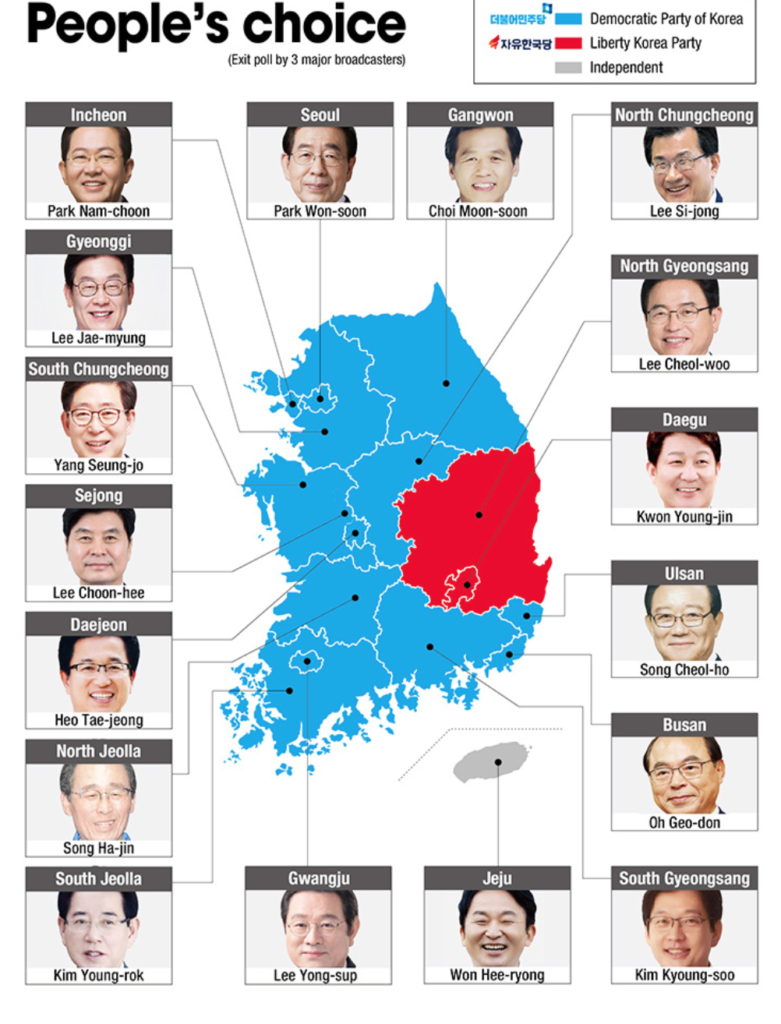Five takeaways from the ruling party’s landslide victory
 On June 14, less than 24 hours after the Trump-Kim Summit in Singapore, South Korea’s ruling Democratic Party (DP) won a landslide victory in local elections, winning 13 of 17 metropolitan mayoral and gubernatorial posts. It was a major boost for President Moon Jae-in and a reaffirmation of his country’s faith in him and his diplomacy with North Korea and the United States. And, as the graphic from the Korea Times illustrates, it was a resounding defeat for the right-wing opposition Liberty Korea Party (the photo above shows LKP leader Hong Joon-pyo leaving his campaign headquarters after the results became clear). Today, DISPATCH KOREA offers an analysis of the elections from Simone Chun, an academic-activist who has taught at Northeastern University in Boston, served as an associate in research at Harvard University’s Korea Institute, and is an active member of the Korea Peace Network. Take it away, Simone!
On June 14, less than 24 hours after the Trump-Kim Summit in Singapore, South Korea’s ruling Democratic Party (DP) won a landslide victory in local elections, winning 13 of 17 metropolitan mayoral and gubernatorial posts. It was a major boost for President Moon Jae-in and a reaffirmation of his country’s faith in him and his diplomacy with North Korea and the United States. And, as the graphic from the Korea Times illustrates, it was a resounding defeat for the right-wing opposition Liberty Korea Party (the photo above shows LKP leader Hong Joon-pyo leaving his campaign headquarters after the results became clear). Today, DISPATCH KOREA offers an analysis of the elections from Simone Chun, an academic-activist who has taught at Northeastern University in Boston, served as an associate in research at Harvard University’s Korea Institute, and is an active member of the Korea Peace Network. Take it away, Simone!
Progressives in Korea now control both the National Assembly and municipal governments
By Simone Chun
- The main right-wing opposition Liberal Korea Party that has thrived on the Cold War and anti-North Korea sentiment suffered its worst defeat ever. It won only two seats in the conservative region: the Daegu city mayor and North Gyongsang province governor.
- The ruling Democratic Party won 14 out of 17 major municipality chiefs and has the majority in the National Assembly (130 out of 200). The Democratic Party defeated the conservative party by a huge margin in administrative, legislative and educational head elections. Progressive victors included Lee Jae-myung, the former Seongnam City Mayor, who was elected Governor of Gyeonggi.
- Governor-elect Lee is currently the most progressive elected leader in South Korea. He became famous for his championing the impeachment of the former President Park Geun-hye early on and his relentless critique of the “neoliberal” economic policies followed by the Park government. The landslide victory will empower President Moon to pursue a more aggressive engagement policy toward North Korea and accelerate his peace initiative, such as the political declaration on ending the Korean War this fall between the two Koreas and the United States, and preparing for a peace treaty within 2 years (to be signed by the two Koreas, the US, and China).
- As President Moon’s cabinets in the Blue House are staffed by the former student activists in the 1980s, President Moon is likely to seek more assertive policies toward regaining Korea’s sovereignty.
- President Moon’s biggest challenges ahead will be on the economic front. The youth unemployment rate is the highest ever in South Korea, and the plight of irregular (part-time, without benefits) workers remain serious. Moreover, the monopoly over South Korea’s economic system by the conglomerates known as chaebol stifles the Korean economy and keeps wages stagnate. If President Moon fail to address these very serious economic problems, he will risk losing popular support. His losing popular support due to these economic issues will negatively affect inter-Korean engagement policy as well. The next election will be held in 2 years for the National Assembly. In the intervening months, President Moon will try to get as much done as possible with regard to the current peace process.

